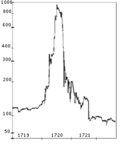Portal:Business
The Business and Economics Portal  Business is the practice of making one's living or making money by producing or buying and selling products (such as goods and services). It is also "any activity or enterprise entered into for profit." A business entity is not necessarily separate from the owner and the creditors can hold the owner liable for debts the business has acquired except for limited liability company. The taxation system for businesses is different from that of the corporates. A business structure does not allow for corporate tax rates. The proprietor is personally taxed on all income from the business. A distinction is made in law and public offices between the term business and a company (such as a corporation or cooperative). Colloquially, the terms are used interchangeably. (Full article...) Economics (/ˌɛkəˈnɒmɪks, ˌiːkə-/) is a behavioral science that studies the production, distribution, and consumption of goods and services. Economics focuses on the behaviour and interactions of economic agents and how economies work. Microeconomics analyses what is viewed as basic elements within economies, including individual agents and markets, their interactions, and the outcomes of interactions. Individual agents may include, for example, households, firms, buyers, and sellers. Macroeconomics analyses economies as systems where production, distribution, consumption, savings, and investment expenditure interact; and the factors of production affecting them, such as: labour, capital, land, and enterprise, inflation, economic growth, and public policies that impact these elements. It also seeks to analyse and describe the global economy. (Full article...) Selected articleMa Yun (Chinese: 马云; pinyin: Mǎ Yún; born 10 September 1964), or more commonly referred as Jack Ma, is a Chinese businessman and philanthropist. He is the founder of the Jack Ma Foundation, and co-founder of Alibaba Group and Yunfeng Capital. As of May 2025, Ma's net worth was estimated at US$27.2 billion. After taking the gaokao three times, Ma earned a bachelor’s degree in English from Hangzhou Normal University in 1988 and was assigned as an English and international trade lecturer at Hangzhou Dianzi University. Interested in internet entrepreneurship since the 1980s, he founded his first business, Hangzhou Hope Translation Agency, in 1994. The following year, he created the agency’s website and then resigned from the university to establish Hangzhou Hope Computer Services Co., Ltd., one of China’s earliest internet startups, which operated an online yellow pages service for Chinese companies. In 1996, Ma’s company was acquired by China Telecommunications Corporation. Following an unsatisfactory collaboration, he left the company the next year and went on to develop websites for China’s Ministry of Foreign Trade and Economic Cooperation. In 1999, he co-founded Alibaba Group, initially as a business-to-business (B2B) e-commerce marketplace and later expanded into a multinational technology conglomerate. Selected image
Selected economyThe economy of South Africa is, as of January 2024, the largest economy in Africa. It is a mixed economy, emerging market, and upper-middle-income economy, and one of only eight such countries in Africa. The economy is the most industrialised, technologically advanced, and diversified in Africa. Following 1996, at the end of over twelve years of international sanctions, South Africa's nominal gross domestic product (GDP) almost tripled to a peak of US$416 billion in 2011. In the same period, foreign exchange reserves increased from US$3 billion to nearly US$50 billion, creating a diversified economy with a growing and sizable middle class, within three decades of ending apartheid. (Full article...) Selected quoteHeroism and the respect it commands is a form of compensation by society for those who take risks for others. And entrepreneurship is a risky and heroic activity, necessary for growth or even the mere survival of the economy. It is also necessarily collective on epistemological grounds-to facilitate the development of expertise. Someone who did not find something is providing others with knowledge, the best knowledge, that of absence (what does not work)-yet he gets little or no credit for it. He is a central part of the process with incentives going to others and, what is worse, gets no respect. I am an ingrate toward the man whose overconfidence caused him to open a restaurant and fail, enjoying my nice meal while he is probably eating canned tuna. In order to progress, modern society should be treating ruined entrepreneurs in the same way we honor dead soldiers, perhaps not with as much honor, but using exactly the same logic (the entrepreneur is still alive, thought perhaps morally broken and socially stigmatized, particularly if he lives in Japan.) For there is no such thing as a failed soldier, dead or alive (unless he acted in a cowardly manner)-likewise, there is no such thing as a failed entrepreneur or failed scientific researcher, any more than there is a successful babbler, philosophaster, commentator, consultant, lobbyist, or business school professor who does not take personals risks. (Sorry.) Psychologists label "overconfidence" a disease, blinding people to the odds of success when engaging in ventures. But there is a difference between benign, heroic type of risk taking that is beneficial to others, in the antifragile case and the nastier modern type related to negative Black Swans, such as the overconfidence of "scientists" computing the risks of harm from the Fukushima reactor. In the case of the former, what they call overconfidence is a good thing, not something to medicate.
TopicsRelated WikiProjectsDid you know (auto-generated) -
On this day in business history
General imagesThe following are images from various business-related articles on Wikipedia.
More did you know
Business news
SubcategoriesRelated portals
Things you can doUrgent and important articles are bold
WikimediaThe following Wikimedia Foundation sister projects provide more on this subject:
SourcesDiscover Wikipedia using portals |










































